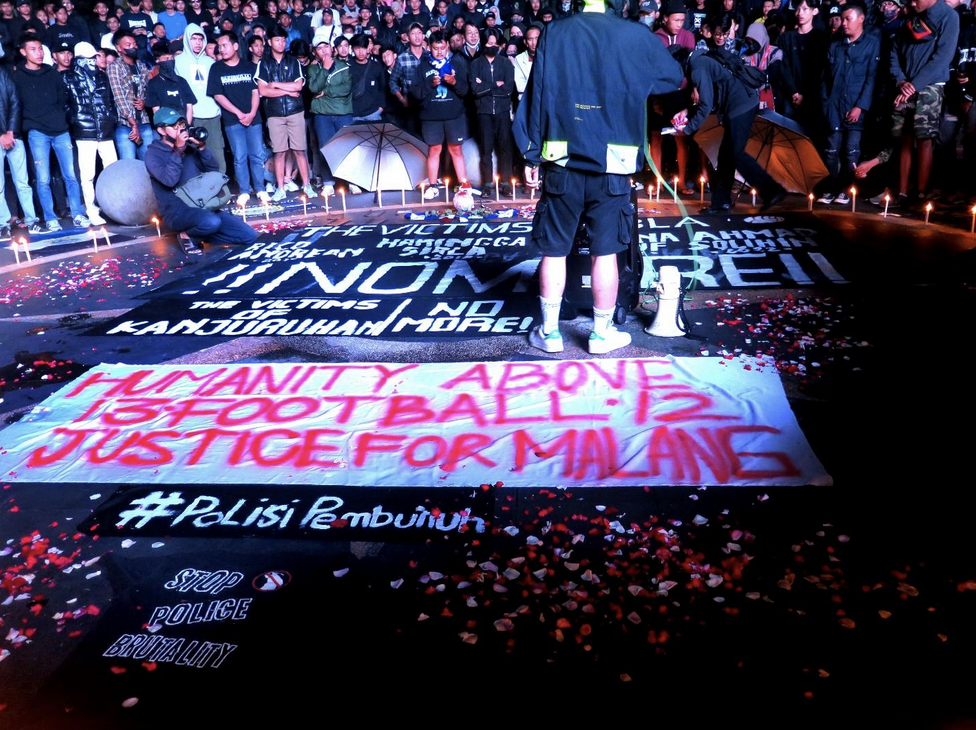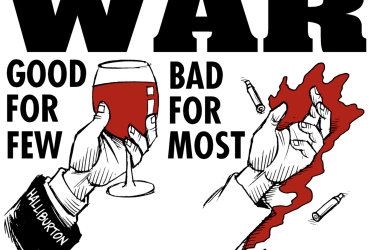By Frans Ari Prasetyo and Gabriel Kuhn
Photos : Candlelight vigil in Bandung to honor the victims of the Kanjuruhan Stadium tragedy. Photo by Frans Ari Prasetyo (02/10/2022)
Background
Football touches and excites millions, there are no places where people gather as regularly in the tens of thousands as in football stadiums. Football reflects society; therefore, it also has the power to change it. Unfortunately, the combination of large crowds and aggressive police can prove disastrous. The events at Kanjuruhan Stadium on October 1, 2022, are proof of this.
In Indonesia, more than 275 million people follow football passionately. Many support their local clubs, the national team, and powerhouses abroad, in England, Spain, and Germany. Football is an intrinsic part of everyday life in Indonesia, and extremely contested. Regional affiliation, ethnicity, local politics, corruption – everything plays into it.
There are many football rivalries in the country because of historical and cultural reasons. In Western Java, the rivalry between Persija Jakarta and Persib Bandung is very pronounced and regularly leads to violent clashes. In recent years, the matches between the clubs have been held at neutral venues, at times with no spectators. In Central Java, the most pronounced rivalry is the one between Persis Solo and PSIM Yogyakarta, with the historical rivalry between the two Javanese kingdoms of Solo and Yogyakarta at its core. In Eastern Java, the main rivalry is the one between Arema FC from Malang and Persebaya Surabaya, echoing the longstanding rivalry between the cities of Malang and Surabaya as the true heir to Javanese high culture. In this case, too, games have been moved to neutral venues and been played without spectators.
The Football Association of Indonesia (Persatuan Sepakbola Seluruh Indonesia, PSSI) was founded in 1930, when Indonesia was still under Dutch rule. In 1938, Indonesia qualified (for the only time in its history) for the World Cup. After independence, the PSSI joined FIFA in 1952 and the Asian Football Confederation in 1954. In 2015, all Indonesian football was banned from FIFA events because of government intervention and widespread corruption within the PSSI.
The Kanjuruhan Stadium catastrophe
On October 1, 2022, the Eastern Java rivals of Arema FC and Persebaya Surabaya met at Kanjuruhan Stadium, Arema’s home ground. Arema lost the game 2:3. It was the first time they lost to Persebaya at home in 23 years. Fans entered the pitch to console the players. The police began attacking the supporters with batons, indiscriminately firing tear gas into the crowd. Supporters on the overcrowded stands rushed for the exits, but, for inexplicable reasons, many of the gates were locked. At Gate 13, 135 people died in a stampede, 35 of them minors. The victims were trampled on and suffocated to death. It was the deadliest disaster in the history of Indonesian football.
Many questions remain. Why did the local football authority sell 42,000 tickets for a stadium with a capacity of 38,000 people? Why did the police respond with batons and tear gas, when supporters non-violently descended on the pitch? Why were the gates locked?
The PSSI’s explanation amounts to little more than “divine destiny”. Apparently, nothing could have been done to prevent this tragedy. But, of course, something could have been done. Had there been no tear gas, and had Gate 13 been open, 135 people would not have died. (The actual number might be significantly higher, as many deaths were not reported. The number of people injured is in the hundreds.)
One must also keep in mind that supporters of Persebaya Surabaya were banned from the game, which caused Arema supporters to bring their families. There was no risk of clashes between rival supporters, which makes the actions of the police even more ludicrous. The police are a far higher danger for football fans in Indonesia than the supporters of opposing teams.
FIFA clearly advises against the use of tear gas in football stadiums. The security at first league matches in Indonesia is the responsibility of the PSSI, but the PSSI has never ratified FIFA’s recommendations for crowd control. At football stadiums in Indonesia, police regularly disregard international conventions when it comes to safety and crowd management.
The police in Indonesia act as bureaucrats with weapons, their main role being the defense of private property and the country’s elite, or whoever else has the money to pay them. The police say their duty is to protect civilians, but which civilians are they protecting? The riot-gear and the weapons they routinely bring to football stadiums escalate conflict. The victims from Kanjuruhan Stadium didn’t die because of divine destiny, they were killed. All Indonesian football supporters agree on this.
Responsibility
Directly after the Kanjuruhan Stadium tragedy, first league games in Indonesia were stopped. After the Men’s World Cup in Qatar, the league resumed play in mid-December, but spectators have not been allowed. In competitions of the ASEAN Football Federation, Indonesian clubs can play without sanctions.
Police officials have been asked to conduct an investigation and evaluate the security situation at football matches. A “joint independent fact-finding team” known under the acronym TGIPF was formed under the auspices of the Coordinating Ministry for Political, Legal and Security Affairs and the Ministry of Youth and Sports.
Yet, no one accepts responsibility for the Kanjuruhan Stadium tragedy. The police say they did everything in accordance with standard operational procedures. The local football authority says it never ordered to lock the gates. League officials claim that the late-night scheduling of the game came at the request of the television rights hoders Indosiar. Indosiar, however, blames the league officials. Three hours and 21 minutes of CCTV footage from the stadium are missing. Nobody knows why.
Five people have been charged with wrongdoing that day, but they are small fish: two members of the local football authority and three low-level police officers. For the victims, it is near impossible to get justice, because the powers that be refuse to accept responsibility. In authoritarian regimes, the oppressor keeps the system afloat in order to perpetuate oppression. The impunity of the police is the reward that the political elite bestows upon them. The political elite has no interest in accountable law enforcement, democracy, or the rule of law.
Under President Joko “Jokowi” Widodo, the authoritarian state has made a strong comeback in Indonesia. Democracy is on the decline. The police is an important tool in this process. During his first six years in office, Jokowi doubled police funding from IDR 57,1 trillion in 2015 to IDR 111,97 trillion in 2021. The biggest chunk of the state budget, IDR 131.2 trillion, goes to the military. IDR 57,4 trillion go to health services, and IDR 36,3 trillion to education.
In the aftermath of the tragedy, political lobbying was more important for the PSSI than caring for the victims. Jokowi sided with the PSSI. He invited FIFA president Gianni Infantino to Indonesia, hoping to avoid sanctions. Most importantly, the PSSI and Jokowi wanted to ensure that Indonesia will indeed host the Men’s Under-20 World Cup in 2023, the first ever FIFA competition on Indonesian soil. A few games before the opening game of the Men’s World Cup in Qatar, Jokowi organized a World Cup celebration during the G20 summit in Bali. So far, the efforts seem to have paid off. The Men’s U20 World Cup in Indonesia is scheduled to go ahead as planned.
During his visit to Indonesia, Infantino had fun playing “charity football” with PSSI officials, among them former police generals such as chairman Moch Iriawan. Iriawan’s predecessor was a former military general, Edy Rahmayadi. It is not surprising that the PSSI refrains from criticizing the police and the military. It actively participates in a systemic and structural cover-up of what happened at Kanjuruhan Stadium.
Football, security forces, and politics are deeply connected in Indonesia. Former PSSI chairman Edy Rahmaydi is today the Governor of North Sumatra. Current PSSI chairman Moch Iriawan is also pursuing a political career and wants to become the Governor of West Java. Acting as PSSI chairman is often a first step into politics, as it provides name recognition. Football fans are then mobilized for political gain, as they are a voting bank. In Bandung, Ridwan Kamil used the popularity of Persib Bandung to be elected as the city’s mayor in 2013. Today, he is the Governor of West Java and a possible future President of Indonesia.
The police and the military in Indonesia are involved in football in many ways. In 2015, the Indonesian military formed the club PS TNI (today, Persikabo 1973), which it lifted directly into the first league through acquiring the club Persiram Raja Ampat from West Papua. This was one of the reasons for the one-year FIFA ban on Indonesian football. The club has no home city, no fan base, no stadium. Soldiers are ordered to attend the matches, otherwise there would be no audience at all. In 2010, the Indonesian police bought the club Persikubar Kutai Barat, which has gone through many name changes since. Currently, it is called Bhayangkara FC and plays in the first league. Chairman of the club is Jokowi’s son.
The independent fact-finding team TGIPF has ordered the PSSI to elect a new chairman. Moch Iriawan is hardly bothered by that, was he wants to move on and become Governor of West Java anyway. Among his possible successors are ministers from the Jokowi administration and top businessmen. One of them, Erick Thohir, already acts as chairman of the Indonesian Olympic Committee. Another candidate, La Nyalla Mattalitti, was jailed for corruption in 2016.
And now?
In capitalism, football is about money. Traditional rivalries between clubs and supporters are milked for commercial gain. If this causes fans to suffer, even die, so be it. Fans are needed for the atmosphere that helps sell the product, but as individuals they are considered dispensable.
Unfortunately, many of us can no longer imagine a different, a better future. Football is sold as leisure for the masses. But there is power in the grassroots. Football is part of the social fabric of Indonesian cities, people come together to watch matches at stadiums, in cafés and on the streets. In Malang, supporters organize marches in the city, demanding that the local football authority, Arema FC, the PSSI, the police, and the politicians that protect them accept responsibility for the Kanjuruhan Stadium tragedy.
How much violence and inhumanity must we witness before we are ready to create a different world of football? Banning the police from football stadiums would be a first step. We must be able to celebrate football without police violence, otherwise it will die. For a long time, fans have been warning about the possible consequences of treating football stadiums as arenas of war.
But it is not enough to dismantle the current system. The current system needs to be replaced by another. We need a dual strategy: while dismantling the old infrastructure, we need to build a new one from scratch. We need to coordinate grassroots resistance, from fan boycotts to fan-controlled clubs. The activities have to coalesce into a broad social movement. When football activists and political militants come together, all is possible.
Frans Ari Prasetyo is an Indonesian independent researcher and scene photographer. He works on urban politics, with a focus on marginalized communities and grassroots activism. Frans has published several articles and photo series on these issues.
Gabriel Kuhn is an Austrian-born writer and translator living in Sweden. Among his books are “Soccer vs the State” and “Antifascism, Sports, Sobriety”. He blogs at www.lefttwothree.org.
Check out more from Gabriel HERE






